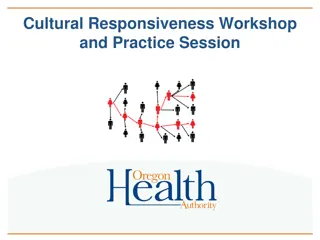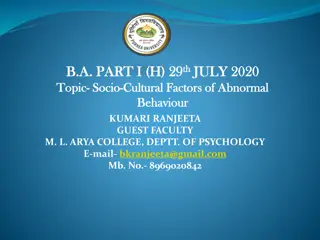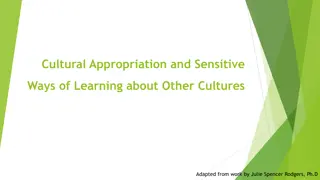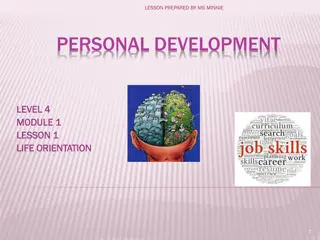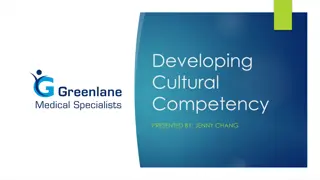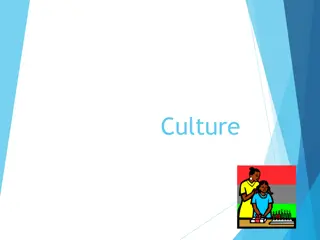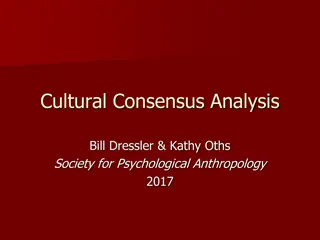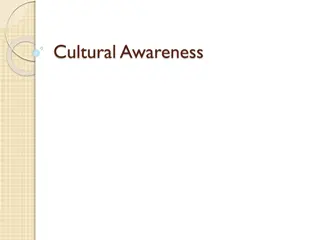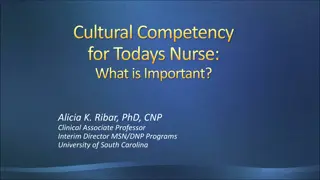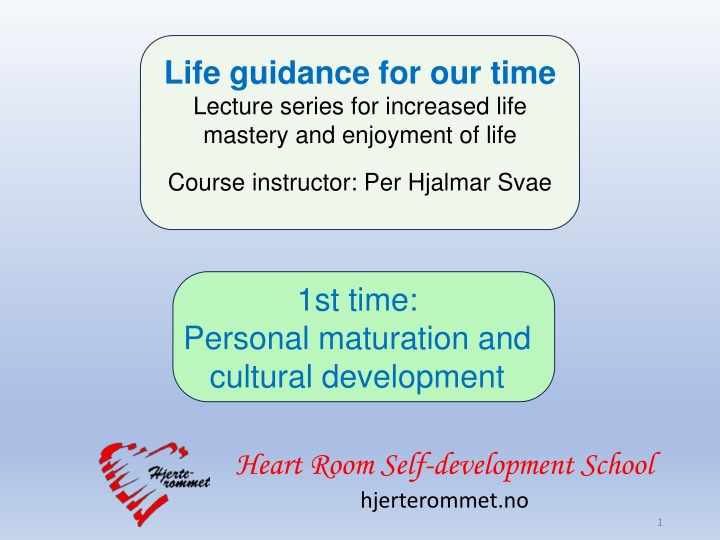
Life Mastery Through Personal Development and Cultural Maturation
Explore the transformative journey of personal maturation and cultural growth in the "Life Guidance for Our Time" lecture series by Per Hjalmar Svae. Discover how to develop positive abilities, leave behind negative patterns, and tap into your core natural being. Gain insights on overcoming negative behaviors and navigating different stages of personal maturity for a fulfilling life.
Download Presentation

Please find below an Image/Link to download the presentation.
The content on the website is provided AS IS for your information and personal use only. It may not be sold, licensed, or shared on other websites without obtaining consent from the author. If you encounter any issues during the download, it is possible that the publisher has removed the file from their server.
You are allowed to download the files provided on this website for personal or commercial use, subject to the condition that they are used lawfully. All files are the property of their respective owners.
The content on the website is provided AS IS for your information and personal use only. It may not be sold, licensed, or shared on other websites without obtaining consent from the author.
E N D
Presentation Transcript
Life guidance for our time Lecture series for increased life mastery and enjoyment of life Course instructor: Per Hjalmar Svae 1st time: Personal maturation and cultural development Heart Room Self-development School hjerterommet.no 1
You can have a really good life by: The course Life guidance for our time: Further develop positive abilities and resources E.g. stable psyche, inner peace, ability to cooperate, ability to carry out, ability to care, etc. Module 1 Positive Mask - Mastery energy Leaving negative patterns behind you E.g. worry, fear, grumpy, anger, jealousy, shame, despair, depression, inferiority, low self-esteem, etc. Module 2 The Core Natural being Develop an ability to be in life energy That is, contact with the life core; our real self, the creative power within us, the heart and the ability to love, the soul and what we really long for, the spirit and the spiritual. Module 3 Negative behaviour The course is based on psychiatrist John Pierrako's model of the human psyche Create a better life and a better world from the core: In love and relationship, as a parent, at work and in society. Module 4 Contributes with knowledge and offers guidance in this process. Heart Room Self-development School
Personal Maturity The Thinking Brain , The Analytical Brain (Neocortex) The Emotional Brain, The Mammal Brain (The Limbic System) The Survival Brain, The Reptilian Brain (The Brainstem)
Stage 1 Imperial Mind Dominant personality The lowest stage of personal maturation Focus: Physical survival and psychological safety. Control center: The survival brain and the fight and flight instinct. (Trump? Putin?) Characteristic: Everything revolves around having one's will and others being totally obedient and loyal. Or the opposite: Totally submissive personality. Source: Robert Kegan: In Over Our heads The mental demands of modern life (1995), et al.
Stage 1 When the survival brain takes over Either an extreme situation psychologically speaking Or to preserve the ego as it is - without developing yourself When that happens, it's about: Physical survival in an emergency. Mental survival The characteristic is that you are in an affective state or become adamant: Affect = Strong, immediate emotional reaction to something. Or that you "freeze into ice" and become cold, stone-hard and adamant. Characteristics of being on this lowest stage: Violent rage. Violent emotion that wants to exit a relationship, relationship, organisation, etc. Fight for "life and death". MUST have your way, whatever it takes!! Heartfelt hatred. Desire to harm and hurt others. Desire to harm another physically, mentally, financially or socially. Strong feelings and absolute black and white thoughts about something. Desire to kill, or to take one's life. Psychopathic behavior Desire to dominate and have power over others
Method to come out of "stage 1 energy" Mental control! 1) Put into words what you actually feel and think. 2) Diagnosing it: Ouch, yes, this is actually on the lowest stage. 3) Take a time-out. Don't say anything, don't do anything as long as you're in strong emotions/hard as a rock. 4) Do as Winnie-the-Pooh to become normal again, i.e. on the 3rd stage. Watch a nice movie (diversion). Have fun with someone. Go for a walk. 5) Use your analytical brain: When you are no longer in affect: o you can analyze the situation o think through the pluses and minuses of different action alternatives o talk to a friend about it in confidence, or professional guidance o decide what is the best thing to say and do.
Stage 2 Socialized Mind Traditional personality Focus: To be like others and be accepted by them. Control center: The emotional brain and the sympathy and antipathy reflex. Characteristics: A person at this stage lives in the herd and has similar feelings and perceptions to the others. o Seeks to control details and demands obedience, or is obedient and conforms. o Strong emotions, opinions and will.
To lift your personality from 2nd to 3rd stage The self-development process at this stage is about coming out of: Herd mentality : Dependence on the opinions and will of others. Trying to be like everyone else in the "pack" and be liked and accepted. Victim mentality: Stuck in hurt and anger, shame and guilt. Feel sorry for yourself. Blaming others. Complaining and whining. Can't stand it. Won't. No use! Etc. Demand mentality: Demands that others meet you, change, sort things out. Demanding to have your will. Etc. Lack of independence: E.g. Lean too much on others. Don't make important choices. Don't dare what you really want. Awkwardness. Inability. Helplessness. Etc. Lack of mental control: The challenge is to gain control over lower impulses and drives on the 2nd stage, so that these are not lived out in real life: Anger, jealousy, envy, rashness, greed, etc.
Step 3: Self-Authoring Mind An Independant individual Focus: To be a free, independent individual within the framework of one's rights and duties. Control center: "The thinking brain", the ego. One has mental control over lower drives and impulses at stages 1 and 2. Characteristics: You think and feel independently, are well-adjusted and follow laws and rules voluntarily. You are able to see several sides of an issue and participate in calm, factual dialogue and democratic conflict resolution.
Characteristics of being on the 3rd stage Where most of us normally are in everyday life You are safe inside yourself You work calmly, balanced and well-adjusted You communicate and argue objectively You seek to create a positive atmosphere and good dialogue You listen to others and try to understand You are able to see a matter from several sides, also from the perspective of others You are able to change your mind with good arguments from others You are able to accept criticism and learn from your mistakes
Falling low = The emotional brain takes control = Characteristics of being in the 2nd stage You must be right and must have your way! Then you only manage to see one side of the matter, your own. You become unreasonable and begin to accuse, distort, deny, ... You get emotional, start arguing, get angry, hurt the other person,... You are unable to change your mind, even if others are right. You are unable to accept criticism and learn from your mistakes. You deny your own weaknesses. Mistakes you make, you blame others for. You are not grateful for what others give or do for you. Life and teaching do not match, for example: o "I'm not angry!" you say. But the voice tells you that you are angry. o "I'm not angry, just engaged", you explain it away. o If you have accused others of something and are reprimanded, you say: o "It was only meant as a joke!", and others get nowhere.
What happens when the emotional brain has taken control? Emotional communication (2nd stage) Conversation discussion heated discussion argument cockfight lasting conflict The 4 horsemen of the apocalypse that destroys relationships Criticism Defense Contempt/ no respect Giving up/ Withdrawal/ making a wall Source: www.gottman.com https://www.arendalpsykoterapi.no/innsikt/
To bring the communication up to the 3rd stage again To come out of emotional communication, the key is that you have to "turn off" your will. You have to accept that you have one view, and that the other person has another view. Then: Only inform about your own view, don't argue to convince the other person. End communication by saying that here we look at this differently = OK Or take a time-out and come back to the matter later o Stop communication o Be as Winnie-the-Pooh" Both of you come back to the 3rd stage o Bring about calm, matter-of-fact, listening communication where both inform about their point of view, and both listen and take action
To bring the communication up to the 3rd stage Methods of good dialogue: The talking stick method Together; write up arguments for and against on a sheet of paper/a board The 5-step method o Facts o Thoughts and attitudes o Emotions o Important considerations and proposals for win-win solutions o Action
Step 4: Self-Transforming mind Fellow human being Focus: Having a good intention and doing one's best in all relationships. Control centre: Balances in the heart, heart feelings, good will and high ethics. Characteristics: o Both and thinking; trying to pay attention to several things at once. o Both-and actions, i.e. care both for others and oneself. o Able to be an independent individual, despite close and mutual relationships. o Able to make good decisions, say wise things and make good decisions.
To lift you from the 3rd to the 4th stage Among other things, it is about this: To develop your sensitivity and the ability to empathize You focus on feeling and becoming aware of what you actually feel. You learn to be quiet, listen, notice and feel what others feel. Deciding to live from the heart This means that you let the needs of others matter as much as your own needs in daily life and when making important and difficult decisions. Developing a high ethic that make you walk as you talk Inside you can feel everything, even the worst negative emotions. But you don't live them out in real life. (If necessary: Symbolic expression.) Developing sensitivity is a challenging process because you have to let go of some of the mental control that lifted you to the 3rd stage - You can become more emotional (2nd step) - You become more vulnerable, because you feel more - You are more often disappointed, because people are selfish
Stage 5 Spiritual being Having a personality at this stage Focus: To serve higher purposes than personal needs by being a servant of the good (God) and creating a good whole (holiness). Control center: The soul and the spirit. Characteristic: A person at this stage lives in agreement with his soul and follows his calling. The soul likes to have spiritual contact and experiences receiving guidance from the spiritual world. Examples of this step for ordinary people Have a spiritual practice Pray and affirm Take your intuition seriously Noticing dreams and interpreting them Mark meaningful coincidences Seek to look after the whole in a good way Try to be a light worker on this earth Mahatma Gandhi
Personal maturation and cultural development Outer evolution Inner evolution Analytical brain neocortex Humans Mammal brain the limbic system Animals Reptilian brain brainstem Plants Cultural development: Ancient Civilizations/Wiking Age The Middel Ages Modern Times
The Development Ladder The purpose of the Life guidance for our time course is to convey knowledge and to provide guidance in the process of lifting you up the development ladder. The Core Centre Of Right Energy Positive Mask Negative Mask In Pierrakos model of the psyche
Cultural legal principles at each of the stages Cultural legal principles Levels of Living Foundation Duty Right Spiritual contact Serve The Good Follow inner voice 5) Spiritual Responsibility Trust Fridom 4) Heart Democracy and rules Duties Rights 3) Mental Obidience Rank Detail managment 2) Emotional Brutal use of power Rule and bully Total submission 1) Physical
The stages in The Developmental Ladder: From external to internal control within ourselves 5th Stage: The sensitivity is further developed so that one receive spiritual guidance which one follows in order to create the good. External management is completely replaced by internal management and responsibility + spiritual guidance. 4th Stage: Heart contact means that you voluntarily want to take care of "everything and everyone". This voluntary ability to take responsibility means that the management of the 3rd stage with rights and duties can increasingly be replaced by freedom and responsibility. External governance recedes even more into the background, but civil disobedience arises as a problem. 3rd Stage: Positive inner mental management creates well-adjusted individuals who voluntarily fulfill their duties and stay within their rights. Following laws and regulations is automated so that external punishment has become less important. 2nd Stage: External control from fear of punishment, especially social punishment, controls most people and make them obedient. But internal control in the form of conscience has arisen. People try to avoid bad conscience, guilt and negative reactions. 1. Stage: Brutal and merciless external control. Most people must obey without murmuring
Interpersonal Problems - The Solution The solution to interpersonal problems is that we personally, privately, socially and collectively develop further in our evolution, and increasingly function exclusively on the top three rungs of the developmental ladder. When we function at the third stage, we are able to see two sides of an issue, discuss problems objectively and resolve conflicts in a civilized manner. We are creating a democracy and a rule of law where the law is above those in power, instead of the other way around. When people function atthe fourth stage, we have a desire for everyone's needs to be taken care of. - With our mental abilities, we get an overview of the situation. - With our spiritual abilities, we search for creative solutions. - In our hearts, we weigh up and choose what takes care of everything and everyone as best as possible.
Proportion of population at different stages (US) Stage in the ladder Share 4 0 % Only 6 % are here Fellow human being 3,5 6 % 3 34 % Independent individual 2,5 33 % Traditional personality 2 14 % 1,5 8 % Trump Putin Xi Jinping 1 5 % Dominant personality Soruce: Robert Kegan: In Over Our Heads The Mental Demands of Modern Life (1995) 60% have low maturity! Low maturity is the reason why we are not ready to solve the climate and nature crisis and create a better world! And that right-wing populism and extremism are gaining ground! - And to Donald Trump's support in the USA!
Governance in the world 3/4 of humanity lives in countries and cultures on the 2nd stage of The Development Ladder Democratic Stage 3 Partly democratic Dictatorship Stage 2 Source: Freedomhouse.org
Breaking The Code of Life A Path to Good Lives, Partnerships and Society (The book is in Norwegian)




